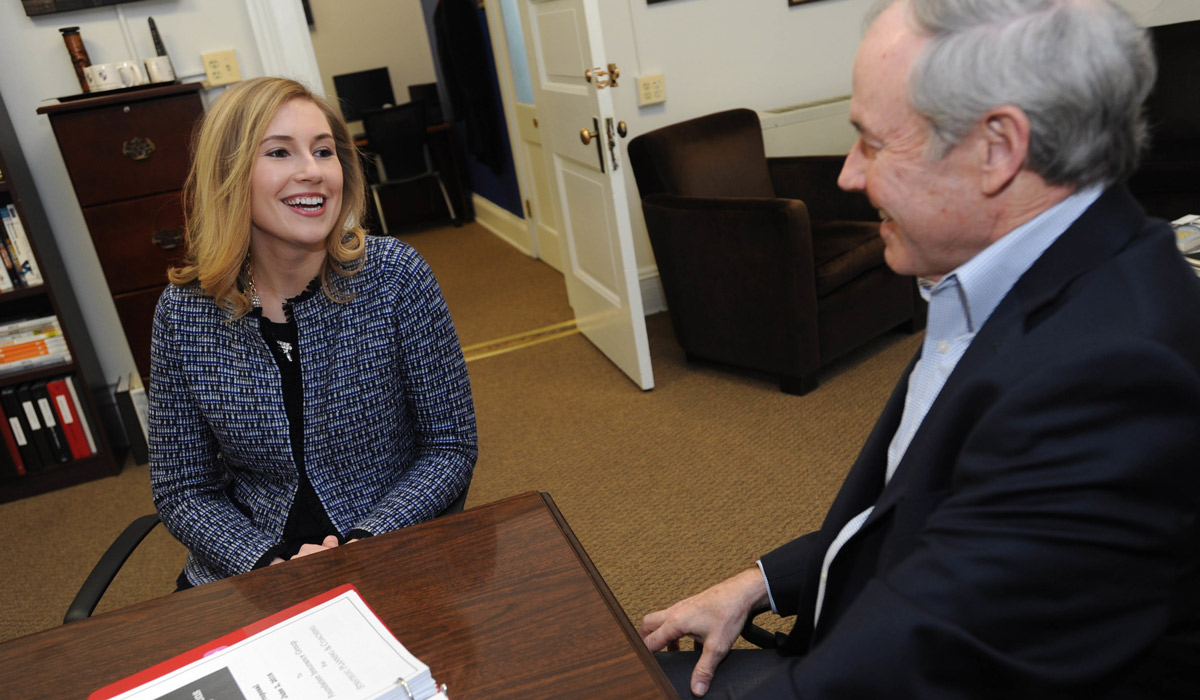

At the Busch School of Business and Economics, learning to live well and ethically is just as important as landing that first great job. Luckily, a degree in business from Catholic University prepares students to do both.
And while it’s only been four years since the school was launched, employers seem to agree. Of the 112 students in the class of 2017, 94 percent were employed full time – with an average salary of $50,000 – or in grad school by six months after graduation.
That may be because whether they’re learning theory in the classroom, networking with entrepreneurs, polishing interview skills, meeting with mentors, or interning in the real world, the goal is always to provide students with a multifaceted approach to their professional lives.
“We don’t just expose them to business opportunities but to every opportunity,” said Marykate Kelly Conroy, career development director, who lauds the school’s small size and classes like the career development seminar, a career development course that students take every year. “We make sure students are studying something they love.”
“Professor [Mark] Weber always says, I’m not going to get you the job, but I will provide you with the tools and opportunities to get the job.”
– Elizabeth Backe
For sophomore Emma Flanagan, that’s international marketing. To that end, she got off to a flying start by studying in Italy last summer as part of the First Year Experience Study Abroad Program. Next summer: Shanghai, where she already has a marketing internship lined up, along with a full slate of business courses.
For this self-professed Type-A personality, “securing a job at the end of the day is very important,” she said. Flanagan’s professors have guided her toward opportunities to enhance her resume and skill set, like the International Business Ethics Case Competition last April in Santa Monica. She gave a 90-second elevator pitch on the importance of establishing an ethical compliance office, winning her category.
Joe Brusstar, a senior in international economics and finance, recalls the support he got in prepping for an internship in Congress the spring of his freshman year: bulking up his resume, holding mock interviews, answering practice questions with confidence.
As for his time on Capitol Hill? “Learning how laws are passed and negotiated was a great experience,” he said, even though it wasn’t quite the right fit in the end. But his internship at J.P. Morgan led to a job he’ll be starting next fall, as an analyst in the corporate and investment bank in New York City, his hometown.
These internships and opportunities are important, said Conroy, because “employers are asking for students to have experience earlier in their academic careers,” she said, not just as seniors.
Formal career coaching – resume and cover letter workshops, interest assessments, job search strategies, networking tips – rounds out what students are getting in the field and the classroom, where teachers routinely invite employers as speakers, facilitating those critical connections.
“I spend about 70 percent of my time helping kids get introduced to companies and getting jobs,” said Mark Weber, an assistant professor in sales. “I just introduce them and they go sell themselves.”
Senior Elizabeth Backe completed an internship in software and hardware sales last summer with an employer Weber introduced her to. “Professor Weber always says, I’m not going to get you the job, but I will provide you with the tools and opportunities to get the job,” said Backe, who expects to have a position lined up by graduation.
Weber often meets one-on-one with students, helping them discern their career interests. He considers this his best advice: “Employment is boring,” he said. “You don’t want a job, you want a passionate opportunity you can’t wait to get to every day.”